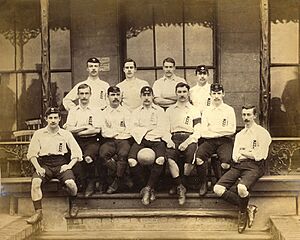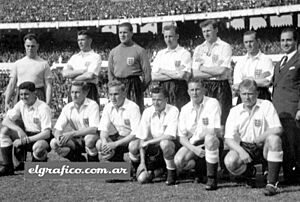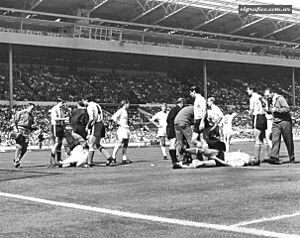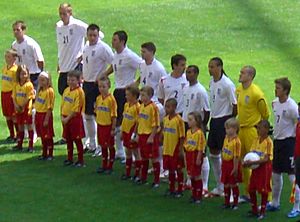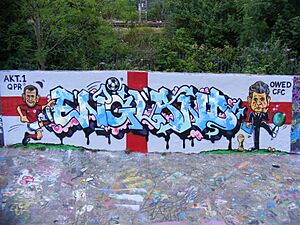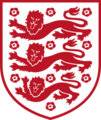History of the England national football team facts for kids
The England national football team, often called the Three Lions, played its first international football match in 1870. Two years later, in 1872, they played their first officially recognised game. For many years, England mostly competed in the British Home Championship against other teams from the UK.
Even though the English Football Association (FA) joined FIFA (the world football governing body) in 1906, there were disagreements. In 1928, the British teams left FIFA because of a dispute about paying amateur players. This meant England didn't play in the first three World Cups.
The Three Lions first played in the World Cup in 1950. Since then, they have been in 16 of the 19 World Cup tournaments up to 2022. England famously won the 1966 World Cup when they hosted it, becoming one of only eight countries to win the trophy. They also reached the semi-finals in 1990 and 2018. England has been knocked out in the quarter-finals seven times, more than any other nation. They also failed to qualify for the finals in 1974, 1978, and 1994.
England also plays in the UEFA European Championship and UEFA Nations League. In UEFA Euro 2020, they reached the final for the first time, finishing as runners-up. They also made it to the semi-finals in 1968 and 1996, which was held in England. Peter Shilton has played the most games for England, and Harry Kane is their top goalscorer. Because England is part of the United Kingdom, they cannot compete in the Olympic Games as a separate team.
Contents
- Early Years of English Football
- Post-War Era: Walter Winterbottom (1946–1962)
- Alf Ramsey (1963–1974)
- Managers Revie and Greenwood (1974–1982)
- Robson's Era (1982–1990)
- The 1990s
- The 2000s: "Golden Generation"
- Roy Hodgson (2012–2016): Tournament Struggles
- Revival Under Gareth Southgate (2016–Present)
- Images for kids
Early Years of English Football
First Matches (1870–1900)
The idea for England's first international matches came from Charles Alcock, the FA Secretary. On 3 November 1870, Alcock announced a match between Scotland and England in London. The first five friendly games were played against Scotland between 1870 and 1872. However, FIFA does not count these as full international matches. This is because the Scottish teams were made up only of Scottish players living in London.
| Match | Date | Venue | Score | Winner |
|---|---|---|---|---|
| England v Scotland (1870) | 5 March 1870 | The Oval, London | 1–1 | Draw |
| 19 November 1870 | The Oval, London | 1–0 | ||
| England v Scotland (1871) | 25 February 1871 | The Oval, London | 1–1 | Draw |
| 17 November 1871 | The Oval, London | 2–1 | ||
| England v Scotland (1872) | 24 February 1872 | The Oval, London | 1–0 |
England's first FIFA-recognised international match was a 0–0 draw against Scotland. It took place in Glasgow on 30 November 1872, with 4,000 fans watching. The Scottish FA had not yet been formed, so the match was organised by Queen's Park. An English newspaper called it "one of the jolliest, one of the most spirited and most pleasant matches".
The first England team in this match included players like Robert Barker as goalkeeper and Cuthbert Ottaway as captain.
In 1873, England beat Scotland 4–2. But in 1878, Scotland won big, beating England 7–2 in Glasgow. Three years later, Scotland won again, 6–1.
The yearly British Home Championship started in 1884, involving England, Scotland, Wales, and Ireland. Scotland won the first competition, beating England 1–0. England's first win in this competition was in 1888. They won all three of their matches, including a 5–0 win against Scotland. This was the same year the Football League was created.
Growing the Game (1900–1939)
As football became more popular in Europe in the early 1900s, the French Football Association suggested forming a European football group. England's FA wasn't keen at first. However, FIFA was founded in 1904, and England joined by 1906. But the relationship between the British teams and FIFA was often difficult. In 1928, the British nations left FIFA. This was due to a disagreement about payments to amateur players, known as 'broken time' payments.
For many years, England mostly played against Scotland, Wales, and Ireland in the Home Championship. This was partly because the UK was very strong in international football. Also, it was hard to arrange games in other countries before air travel became common.
England first played against teams from mainland Europe in 1908. They toured Central Europe, beating teams like Austria, Hungary, and Bohemia. England's first loss outside the UK was a 4–3 defeat to Spain in Madrid in May 1929.
The England national amateur football team was formed in 1901. This was because it became harder for amateur players to get into the main national team. In the Olympic Games, Great Britain represents the UK, not individual countries like England. The Great Britain teams that won gold medals in the 1908 and 1912 Olympic football tournaments were made up of England's amateur players.
Because England was not part of FIFA at first, they did not enter the first three World Cups. In the 1930s, the British government sometimes influenced who England could play. However, England did beat the reigning World Cup champions, Italy, 3–2 in November 1934. This match was called the "Battle of Highbury". It made many English people believe their team was the best in the world.
In May 1938, England toured Europe. Their first match was against Germany in Berlin. The German government wanted the game to be a show of their power. Before the game, an FA official told the England players they had to make the Hitler salute during the German national anthem. The players were very angry about this. However, the official returned, saying the British Ambassador had ordered them to do it. He said the political situation was very sensitive. So, the England team reluctantly raised their right arms. Only Stan Cullis refused and was later dropped from the squad.
About 110,000 people watched the game, along with important German officials. England won the game 6–3. One goal by Len Goulden was described by Stanley Matthews as "the greatest goal I ever saw in football".
On 1 September 1939, Germany invaded Poland, starting World War II. The British government immediately banned large gatherings, which ended all league football matches. Some unofficial wartime international games were played between 1939 and 1945.
Post-War Era: Walter Winterbottom (1946–1962)
Between 1945 and 1946, England played several unofficial "victory internationals". The FA rejoined FIFA in 1946, helped by a feeling of unity in Europe after the war. That same year, Walter Winterbottom became the England Team Manager. At first, he didn't pick the team himself; a committee did.
Winterbottom's time started well with many big wins. In 1948, England had two notable victories: 4–0 against world champions Italy and 10–0 against Portugal. After the Portugal game, the players were famously called the "lions of Lisbon".
However, England's luck soon changed. In 1949, they lost at home for the first time to a non-UK team, falling 2–0 to the Republic of Ireland. England went to their first World Cup in 1950 as one of the favourites. They won their first game 2–0 against Chile. But in their second match, they suffered a shocking 1–0 defeat to the United States. They then lost 1–0 to Spain and failed to get past the first group stage.
England's weaknesses became very clear on 25 November 1953, when a strong Hungary team came to Wembley. With legendary players like Ferenc Puskás, Hungary completely outplayed England, winning 6–3. This was England's first home loss to a team from outside the UK. In the return match in Budapest, Hungary won 7–1. This is still England's worst defeat ever. After the game, England player Syd Owen said, "It was like playing people from outer space." After this, Winterbottom was allowed to help pick the team.
In the 1954 World Cup, Ivor Broadis became the first England player to score two goals in a World Cup game. This happened in a 4–4 draw against Belgium. England reached the quarter-finals for the first time but lost 4–2 to Uruguay.
Munich Air Disaster and the 1958 World Cup
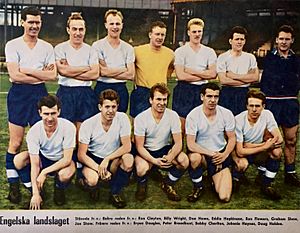
On 15 May 1957, Stanley Matthews played his last game for England at 42 years old, making him the oldest player to represent his country.
Hopes for the 1958 World Cup were severely affected by the Munich air disaster in February that year. This tragedy killed eight Manchester United players. Three of them were important England players: Roger Byrne, Tommy Taylor, and Duncan Edwards. David Pegg also died, and Johnny Berry was injured so badly he never played again.
Forward Bobby Charlton, who was injured in the crash, recovered and made his England debut in April. He went on to have a great career, playing 106 games, scoring 49 goals, and winning a World Cup. In the 1958 World Cup in Sweden, England was knocked out in the group stages after losing a play-off to the Soviet Union.
By the 1960s, England's tactics and training started to get better. They performed well in the 1962 World Cup in Chile, losing 3–1 in the quarter-finals to the eventual winners, Brazil. More young talents like the defender Bobby Moore were emerging. After Winterbottom left in 1962, England's former captain Alf Ramsey was appointed manager. Crucially, Ramsey gained the right to choose the squad and team himself, taking that power away from the selection committee.
Alf Ramsey (1963–1974)
As part of the FA's 100th birthday celebrations, England played a "Rest of the World XI" team at Wembley Stadium and won 2–1.
World Champions (1966)
Two months before the 1966 World Cup, which England was hosting, manager Alf Ramsey bravely predicted that England would win. His prediction came true, and the 1966 World Cup was England's greatest moment. Ramsey's team was nicknamed the "Wingless Wonders" because he used a new system that relied on hard-working midfield players instead of traditional wingers.
In the group stage, England won two games and drew one. A great 30-yard shot by Bobby Charlton against Mexico was a highlight. In the last group match against France, striker Jimmy Greaves got injured. This led Ramsey to pick Geoff Hurst for the quarter-final against Argentina. Hurst scored the only goal in that game. Bobby Charlton then scored both goals in a 2–1 semi-final win over Portugal, sending England to the final against West Germany.
Even though Greaves was fit again, Ramsey stuck with Hurst. England won the final 4–2 after extra time. Hurst scored three goals, and Martin Peters scored one. Hurst's second goal was controversial, as West Germany's players argued the ball did not fully cross the goal-line. Bobby Moore became the first and only England captain to lift the World Cup. The BBC commentator Kenneth Wolstenholme famously said, "Some of the crowd are on the pitch, they think it's all over!...It is now!"
The Three Lions qualified for the UEFA Euro 1968 tournament by beating Spain 3–1 over two games. At the 1968 European Championships, England reached the semi-finals but lost 1–0 to Yugoslavia. Alan Mullery became the first England player to be sent off. In the third-place play-off, England beat the Soviet Union 2–0.
1970 World Cup
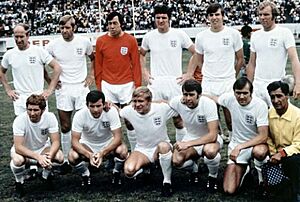
For the 1970 World Cup in Mexico, Sir Alf Ramsey believed England had an even stronger squad than in 1966. Key players like Bobby Charlton, Moore, and Gordon Banks were still there. New players like Mullery and Colin Bell had joined the team. England's preparations were disturbed when Bobby Moore was arrested in the "Bogotá Bracelet" incident, but he was later released.
Despite the intense heat, England easily reached the quarter-finals. They lost 1–0 to favourites Brazil in the group stage. That game was famous for a stunning save by Banks from Pelé and one of Moore's best performances.
In the quarter-finals, England again faced West Germany. However, Banks was sick with food poisoning, and Peter Bonetti played instead. England went 2–0 up early in the second half with goals from Mullery and Peters. But the Germans fought back to 2–2. Gerd Müller then scored the winning goal for Germany in extra time. Bobby Charlton played his last game for England in this match. This would be England's last World Cup finals match for 12 years.
Missing Out (1972–1974)
England failed to reach the final stages of the 1972 European Championships after losing to West Germany again. The Germans won 3–1 at Wembley and drew 0–0 in Berlin.
Attention then turned to qualifying for the 1974 World Cup. England had not needed to qualify since 1962 because they were hosts in 1966 and champions in 1970. After playing Wales, England faced Poland, who were Olympic champions. England lost 2–0 in Poland due to defensive errors. In that game, Alan Ball was sent off, meaning he would miss the return match.
England needed to win against Poland at Wembley to qualify. England created many chances but couldn't score, largely because of the amazing performance of the Polish goalkeeper, Jan Tomaszewski. Poland scored first, and even though Allan Clarke equalised from a penalty, the game ended 1–1. England was knocked out of the World Cup qualifiers for the first time. Poland went on to finish third in the World Cup that summer. Three months later, in April 1974, the FA decided to remove Ramsey as manager.
Managers Revie and Greenwood (1974–1982)
After a short time with Joe Mercer as temporary manager, the FA appointed Don Revie as Ramsey's permanent replacement. England failed to qualify for the 1976 European Championships. They had a good start with a 3–0 win over Czechoslovakia and a 5–0 win over Cyprus, where Malcolm Macdonald scored all five goals.
However, a 2–1 defeat in Czechoslovakia and a 0–0 draw at home against Portugal meant England missed out on qualification by one point. Revie's methods were criticised. He resigned to take charge of the United Arab Emirates national team. He was later banned from working in English football for a decade, though he overturned the ban on appeal.
The FA chose Ron Greenwood to replace Revie. Greenwood could not save England's World Cup campaign for 1978. A 2–0 defeat by Italy in Rome in November 1976 had already done too much damage. Even though England won the return game against Italy 2–0, they missed out on qualification due to goal difference.
Euro 1980
Greenwood led England to their first major tournament in ten years when they qualified for the European Championship finals in Italy in 1980. During the qualification, Viv Anderson became the first black player to play for England in November 1978. England did not play well at the finals and did not get past their group. The team's matches, especially abroad, started to attract more football hooligans. Italian police even had to use tear gas during the match against Belgium.
1982 World Cup
With new talents like Bryan Robson and Glenn Hoddle, England focused on qualifying for the 1982 World Cup in Spain. England struggled at times, losing away games to Norway, Switzerland, and Romania. However, England eventually qualified with a 1–0 win against Hungary in their final game.
At the finals, England won all three of their group games. Robson scored just 27 seconds into the opening match against France. England was knocked out in the second round, finishing second in a tough group with Spain and West Germany. Despite being unbeaten in five matches, they didn't progress. Greenwood announced his retirement after the tournament.
Robson's Era (1982–1990)
Bobby Robson became the new manager. Although he was often criticised by the media at the time, many fans now see him as one of England's more successful managers. He started poorly by not telling captain Kevin Keegan that he wouldn't be picked for the first squad. Keegan found out from the media and retired from international football.
On the pitch, Robson's England failed to reach the final stages of the 1984 European Championships. Their hopes ended when they lost 1–0 to Denmark at Wembley in 1983. Robson offered to resign, but the FA refused. The England team was changing, with older players leaving and impressive younger players like striker Gary Lineker and winger Chris Waddle joining. They easily qualified for the 1986 World Cup in Mexico.
In the heat of Monterrey, England started the World Cup badly, losing to Portugal and drawing with Morocco. In the Morocco game, Ray Wilkins became the first England player to be sent off at a World Cup. Captain Bryan Robson also got injured and left the tournament. Under pressure, England saved their campaign with a win over Poland, thanks to a hat-trick from Lineker.
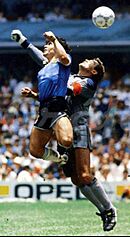
In the second round, England beat Paraguay 3–0 in Mexico City, with Lineker scoring twice more. But they lost in controversial circumstances to eventual winners Argentina in the quarter-finals. Diego Maradona scored two memorable goals: the infamous "Hand of God" goal, where he punched the ball into the net, and a brilliant second goal where he dribbled past several players. Lineker scored one goal back, but England lost 2–1. Lineker won the Golden Boot as the tournament's top scorer with six goals.
England faced a setback two years later at the 1988 European Championships in West Germany. They qualified easily, but key defender Terry Butcher broke his leg before the tournament. England then lost all three of their group games at the finals. This included a 1–0 defeat to the Republic of Ireland, managed by Jack Charlton, a member of England's 1966 World Cup team.
England's performance led to public criticism of Robson. He offered to resign again, but the FA rejected it. England then looked to qualify for the 1990 World Cup in Italy. They finished second in their qualifying group without conceding a goal. This was Robson's last tournament as manager. It turned out to be England's best World Cup since 1966. After a slow start in the group stage, they won close games against Belgium and Cameroon in extra time. They were beaten in Turin on penalties by West Germany in the semi-finals after a 1–1 draw.
England lost the third-place play-off 2–1 to Italy and finished fourth. Peter Shilton retired from international football after the World Cup with 125 caps, which is still an England record.
The 1990s
Graham Taylor (1990–1993)
Graham Taylor took over from Robson. He struggled to build on the team's success from 1990 and dropped experienced players. England qualified for the 1992 European Championships in Sweden but were knocked out in the group stage without winning a game and scoring only one goal. Taylor was heavily criticised for taking off Lineker in his final England game, when England needed a goal.
England hit another low under Taylor when they lost 2–0 to the United States in 1993. England then failed to qualify for the 1994 World Cup in the United States. They lost away games to Norway and the Netherlands. In the Netherlands game, Ronald Koeman fouled an England player but was not sent off. He then scored shortly after, and England lost 2–0. In their last qualifying match, England shockingly went 1–0 down to San Marino after just eight seconds. Although England won 7–1, the Netherlands also won their game, which meant England was eliminated.
Taylor resigned the following week. His time as manager is seen as one of the most difficult in England's history. On 28 January 1994, Terry Venables was appointed manager.
Terry Venables: Euro 1996 ("Football Comes Home")
Venables led England to a much better performance at UEFA Euro 1996. As hosts, England qualified automatically for the tournament, which marked 30 years since the 1966 World Cup win. England played all their matches at Wembley and won their group. They had a famous 2–0 victory over Scotland, with a key penalty save by David Seaman and an amazing goal by Paul Gascoigne. The Three Lions also beat the Netherlands 4–1.
In the quarter-finals, England won a penalty shoot-out for the first time in a match against Spain. However, England then lost a semi-final on penalties to Germany after a 1–1 draw. Gareth Southgate missed the deciding penalty. Alan Shearer, who had become England's main striker, was the tournament's top scorer with five goals.
Due to disagreements with the FA about extending his contract, Venables announced in January 1996 that he would step down after the European Championships.
Glenn Hoddle (1996–1999)
On 2 May 1996, Glenn Hoddle was named the new England manager. He chose Shearer as his captain. Hoddle led England to qualify for the 1998 World Cup in France with a 0–0 draw against Italy in Rome. In 1997, his team also won a friendly tournament against Brazil and Italy.
However, Hoddle was criticised for not including popular players like Paul Gascoigne in his World Cup squad. England were knocked out of the World Cup on penalties in the last 16 by Argentina. This was a classic match played in intense heat. England had led after a fantastic goal from 18-year-old striker Michael Owen. But they had to hold on for a 2–2 draw after David Beckham was sent off.
Hoddle was dismissed on 2 February 1999.
Kevin Keegan (1999–2000)
Under pressure from the media and public, the FA appointed England's former captain Kevin Keegan as Hoddle's replacement. Keegan's team struggled to qualify for the 2000 European Championships. After some poor performances, England reached the play-offs. They qualified by beating Scotland 2–1 over two games. Before the tournament, Shearer announced he would retire from international football after the finals. At the finals, a weak England team failed to get past the group stage. They lost to Portugal, beat Germany 1–0, but were then eliminated by Romania, who scored a winning penalty with two minutes left.
On 7 October 2000, after losing a World Cup qualifier to Germany in the last game at Wembley before it was rebuilt, Keegan resigned. He said he was "a little bit short for what is required of this job". The FA then began talks with Sven-Göran Eriksson. While a deal was being made, Howard Wilkinson was temporarily in charge for a qualifier against Finland, which ended 0–0. A month later, it was confirmed that Eriksson would be the new manager.
The 2000s: "Golden Generation"
Sven-Göran Eriksson (2001–2006)
Sven-Göran Eriksson from Sweden was the first foreign coach to manage England, which caused some debate. However, he quickly turned the team's qualifying campaign around. They had a famous 5–1 victory over Germany in Munich, coming from behind with goals from Emile Heskey, Steven Gerrard, and a Michael Owen hat-trick. England qualified for the 2002 World Cup after a tense final game against Greece. David Beckham scored a free-kick in the last seconds to make it 2–2, putting England top of their group.
In the finals in South Korea and Japan, England beat Argentina 1–0 in the group stage, with David Beckham scoring a penalty. They reached the quarter-finals, where they met Brazil. England went ahead, but Brazil scored two goals to win 2–1. England couldn't create more chances, even after a Brazil player was sent off, and they were eliminated by the eventual winners.
For the 2004 European Championships, England topped their qualification group. Teenage striker Wayne Rooney became a new star in their attack. In England's first match against France, Frank Lampard scored. Despite a missed penalty from Beckham, England led until the final minutes, when Zinedine Zidane scored two quick goals for France to win 2–1. England progressed with Rooney scoring twice in games against both Switzerland and Croatia. In the quarter-finals, Owen scored early against hosts Portugal. But England's challenge was hurt when Rooney broke a bone in his foot. England eventually lost in a penalty shoot-out after a 2–2 draw.
In 2005, Eriksson received criticism for his defensive tactics and not changing things during games. A 4–1 loss to Denmark in a friendly was followed by a shocking 1–0 defeat to Northern Ireland in a World Cup qualifier. However, England still qualified for the 2006 World Cup finals.
In January 2006, it was announced that Eriksson would step down after the World Cup finals. On 4 May 2006, Steve McClaren was named as his replacement.
England's 2006 World Cup campaign started with a 1–0 win against Paraguay. Late goals from Peter Crouch and Gerrard then secured England's place in the last 16 with a 2–0 victory over Trinidad and Tobago. Rooney started England's final group match against Sweden, but his strike partner Owen was injured early. A great goal from Joe Cole gave England the lead, but Sweden equalised. Gerrard scored again for England, but Sweden levelled in the 90th minute, making it 2–2.
In the second round, England beat Ecuador 1–0 with a free-kick from Beckham. He became the first England player to score in three World Cup tournaments. In the quarter-final against Portugal, Beckham was substituted with an ankle injury. Then Rooney was sent off. A 0–0 draw led to a penalty shoot-out that England lost 3–1. Lampard, Gerrard, and Jamie Carragher all missed their penalties. The next morning, a tearful Beckham announced he was stepping down as captain.
Steve McClaren (2006–2007): Failing to Qualify
England's new manager Steve McClaren took over after the 2006 World Cup. He appointed John Terry as captain and did not pick Beckham for almost a year.
England played their first match at the new Wembley Stadium against Brazil on 1 June 2007. Terry scored in a 1–1 draw, and Beckham was recalled for this game. After wins in Euro 2008 qualification, another victory against Russia would have guaranteed qualification. But despite England taking a first-half lead, Russia came back to win 2–1.
Russia's later defeat to Israel gave England another chance. They now needed a draw against Croatia, who had already qualified. McClaren picked inexperienced players. Scott Carson made his debut in goal, and his mistake gave Croatia a 1–0 lead, which they soon doubled. England improved in the second half, with Lampard scoring a penalty and Crouch equalising. But Mladen Petrić's late winning goal for Croatia meant England missed their first major tournament since the 1994 World Cup.
McClaren refused to resign, but the next day, he was sacked by the FA.
Fabio Capello (2007–2012)
On 14 December 2007, Fabio Capello, a famous Italian manager, was named as the new manager of England. England won all of their first eight matches in their 2010 World Cup qualifying group, including a 5–1 victory against Croatia. They qualified with two games to spare.
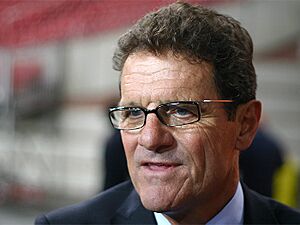
England went to the 2010 World Cup in South Africa. Their opening match against the United States started well with Gerrard scoring early. But Clint Dempsey equalised with a shot that goalkeeper Rob Green mishandled. The game ended 1–1. England's second match against Algeria was a 0–0 draw. The English media questioned Capello's tactics and the team's ability to handle pressure.
In the final group match, England won 1–0 against Slovenia thanks to a goal from Jermain Defoe. However, the United States's last-minute winner against Algeria meant England finished second in the group. This meant they would face Germany in the second round. Germany took an early 2–0 lead. A goal for Matthew Upson brought England back into the game. Then, 53 seconds later, Frank Lampard hit a shot that bounced off the crossbar and appeared to cross the line, but no goal was given. After the match, the FIFA President apologised for the incident. Germany scored two more goals in the second half to win 4–1.
Fabio Capello remained as manager despite talk about his future after England's heaviest World Cup finals defeat. England secured qualification for Euro 2012 with a 2–2 draw in Montenegro. However, the qualification was marked by the sending-off of Rooney, which meant he was suspended for the first game of the finals.
Roy Hodgson (2012–2016): Tournament Struggles
In February 2012, Capello resigned. On 1 May 2012, the FA announced that Roy Hodgson would take over as manager. Steven Gerrard was made captain again. Hodgson's first competitive match was England's opening European Championship match against France, a 1–1 draw. A dramatic 3–2 win over Sweden, followed by a tense 1–0 victory over Ukraine, saw England top their group. They then faced Italy in the quarter-finals. After a 0–0 draw where England was outplayed, England once again lost on penalties.
In 2013, the FA celebrated 150 years. England started using kits made by Nike, ending a long partnership with Umbro. England secured qualification for the 2014 World Cup by beating Poland 2–0 at home.
England failed to get out of the group stage of the World Cup in Brazil. They lost to Italy and Uruguay, and drew 0–0 against Costa Rica. Costa Rica's earlier win over Italy meant England was eliminated before their final match. After a disappointing World Cup, Steven Gerrard and Frank Lampard retired from international football. Wayne Rooney became the new captain.
England's first match after the tournament, a 1–0 friendly win over Norway, had the lowest attendance at the new Wembley. In September 2015, England beat San Marino to become the first team to qualify for the 2016 European Championships. Against Switzerland, Rooney broke Bobby Charlton's England goalscoring record with his 50th goal. England finished their qualifying group with a 100% winning record.
England were drawn in Group B for Euro 2016 to face Russia, Wales, and Slovakia. Their first match against Russia ended in a 1–1 draw. In their second match against Wales, England fell behind. Hodgson brought on forwards Jamie Vardy and Daniel Sturridge at half-time, and both scored, with Sturridge netting the winner in stoppage time.
Hodgson rested six players for the final group match against Slovakia, which ended in a 0–0 draw. Wales's win meant England finished second in Group B and faced Iceland in the second round. Rooney scored a penalty early, but Iceland immediately equalised. Then, in the 18th minute, Kolbeinn Sigþórsson scored with the help of poor goalkeeping. Iceland defended strongly, and England struggled to recover, losing 2–1. England's players were booed off the pitch, and Hodgson announced his resignation right after the match.
Sam Allardyce (2016): Gone in 67 Days
Less than a month after the European Championship defeat, the FA appointed Sam Allardyce as the new manager. Allardyce's first match for England was a 2018 World Cup qualifying match in Slovakia. England won 1–0 with a goal in stoppage time.
Shortly before the next games, a newspaper reported that Allardyce seemed to be explaining how to "get around" football transfer rules. He also appeared to mock Hodgson and England players. Allardyce apologised, but the FA sacked him. His time as manager lasted only 67 days, the shortest for a permanent England manager.
Revival Under Gareth Southgate (2016–Present)
2018 World Cup
On the same day Allardyce left, Gareth Southgate was put in temporary charge of the national team. On 30 November, he was appointed on a four-year contract. England finished first in their World Cup qualifying group with eight wins and two draws, scoring 18 goals and conceding just three.
At the World Cup, England were in a group with Belgium, Tunisia, and Panama. They started by beating Tunisia 2–1, with two goals from captain Harry Kane. They then hammered Panama 6–1, England's biggest win at a World Cup or European Championships. Kane scored a hat-trick. With qualification already secured, England lost 1–0 to Belgium and finished second in the group.
England played Colombia in the second round. They led 1–0 through a penalty from Kane but conceded a goal in stoppage time. After extra time, they won 4–3 on penalties, with Eric Dier scoring the winning kick. It was England's first penalty shoot-out win at the World Cup. England beat Sweden 2–0 in the quarter-finals to reach the World Cup semi-finals for the first time since 1990. They lost 2–1 after extra time in the semi-finals to Croatia, despite taking the lead early. England played Belgium again in the third-place play-off and lost 2–0, finishing fourth. Kane won the Golden Boot for the tournament with six goals.
England took part in the first UEFA Nations League season. They lost 2–1 to Spain at Wembley but then had an impressive 3–2 win in Spain. On 15 November, England played a friendly against the United States. Wayne Rooney came out of international retirement to play one final game, his 120th cap, as England won 3–0. England then won their final Nations League group match against Croatia 2–1 to qualify for the finals.
In the Nations League finals in Portugal, England lost 3–1 after extra time to the Netherlands in the semi-finals. They won the third-place play-off against Switzerland on penalties after a 0–0 draw.
In November 2019, England played their 1,000th international match, a big 7–0 home win over Montenegro. This ensured qualification for the 2020 European Championships.
The COVID-19 pandemic caused many games to be cancelled, and the European Championships were postponed by one year. England did not play in 2020 until September. Many matches were played without fans. England finished third in their Nations League group and did not qualify for the finals.
Euro 2020: England Reaches the Final
The European Championships, originally for 2020, were held in the summer of 2021. Some matches were held in England. Limited crowds were allowed, with more fans as the tournament went on. England were in a group with Croatia, Scotland, and Czech Republic, playing all three games at Wembley. They started with a 1–0 win over Croatia. England drew 0–0 with Scotland but beat the Czech Republic 1–0 to finish top of the group.
In the second round, England beat Germany 2–0. They then beat Ukraine 4–0 in Rome in the quarter-finals. England returned to Wembley for the semi-final against Denmark. Denmark scored first, the first goal England had conceded in the tournament. England quickly equalised with an own goal. England continued to play well and were given a controversial penalty in extra time. Kane's penalty was saved, but he scored from the rebound, sending England to their first major final since 1966.
England faced Italy in the final at Wembley. England started well and took the lead after two minutes through Luke Shaw, his first goal for the country. However, Italy played better in the second half and equalised. There were no more goals in extra time. In the penalty shoot-out, Rashford, Sancho, and Saka all missed, and Italy won 3–2.
England confirmed their qualification for the 2022 World Cup in November 2021 with a 10–0 away win against San Marino. This was the first time England had scored ten goals in a match since 1964.
The team had a poor 2022–23 Nations League campaign, finishing last in their group. They were relegated to League B after a 1–0 defeat to Italy. England had also lost twice to Hungary, including a 4–0 home defeat, their biggest home loss since 1928.
2022 World Cup
For the 2022 FIFA World Cup, England were in Group B with Iran, the United States, and Wales. In their first match, England beat Iran 6–2. England then drew 0–0 with the United States. In the final group match, England confirmed qualification as group winners with a 3–0 win against Wales.
In the round of 16, England faced Senegal. Late first-half goals from Jordan Henderson and Harry Kane put England in control, before Saka added a third. England were eliminated in the quarter-finals by reigning world champions France. France scored early. Harry Kane equalised from the penalty spot, scoring his 53rd England goal, which made him level with Wayne Rooney as the national team's record goalscorer. Late in the match, France scored again. England were given another penalty, but Harry Kane missed, and England were eliminated. Despite the defeat, many experts praised England's performance against France. With this loss, England became the first country to be knocked out of the World Cup at the quarter-final stage seven times.
Euro 2024
In a UEFA Euro 2024 qualifying match, Harry Kane scored his 54th England goal, breaking the all-time goalscoring record in a 2–1 win against Italy. England remained unbeaten throughout 2023.
Images for kids
 | Kyle Baker |
 | Joseph Yoakum |
 | Laura Wheeler Waring |
 | Henry Ossawa Tanner |


